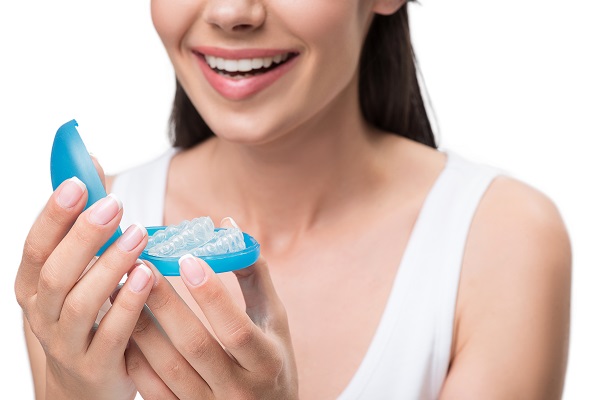 Consulting with a dentist about using orthodontics like braces is the first step toward getting straighter teeth. Orthodontic devices move teeth to a more optimal alignment by applying constant force on them. Treatment times vary for each patient based on their unique condition, but it is typically somewhere between 12 to 36 months.
Consulting with a dentist about using orthodontics like braces is the first step toward getting straighter teeth. Orthodontic devices move teeth to a more optimal alignment by applying constant force on them. Treatment times vary for each patient based on their unique condition, but it is typically somewhere between 12 to 36 months.
Misaligned teeth can ruin anyone’s smile, and they make it harder to keep teeth surfaces clean. This increases the risk of the person developing dental issues like gum disease and tooth decay. Treating poorly aligned teeth with orthodontics can improve the way that teeth look and protect the patient from oral and general health problems.
Consulting with a dentist for orthodontics
Getting misaligned teeth starts with a conversation with a dentist. The oral professional talks to the patient about any problems that their bite issues are causing, like frequent cuts to soft tissues in the mouth, breathing problems, or difficulty swallowing.
The dentist then performs a visual examination of the patient’s teeth to determine how badly their teeth are misaligned. Diagnostics tools like CT scans and X-rays might be used to help make this evaluation.
Once the dentist has a solid grasp of the alignment problems that the patient is dealing with, they will educate the patient about their options, and a customized treatment plan is created. Factors that determine how a dentist might decide to approach treating misaligned teeth include the patient’s age, the cause of their bite problems, and how committed they are to having straighter teeth. Oral appliances that might be recommended to patients with bite problems include the following.
Metal braces
Getting metal braces has been the go-to solution for straightening teeth for at least a century. Braces are permanently attached to the patient’s teeth for the duration of their treatment, so they are an ideal solution for people who might not be disciplined enough for alternatives like clear aligners, as these have a strict wearing schedule. Braces are one of the most versatile oral appliances used for teeth straightening, and they can be used to address most bite issues, like overbites, underbites, and crossbites.
Ceramic braces
These are more discreet than traditional metal braces. The metal components of the latter are replaced with tooth-colored brackets and transparent wires, so the patient gets braces that are barely noticeable in their mouth. Ceramic braces can be used to address many of the same bite issues that metal braces can tackle.
Clear aligners
Getting aligners is a popular way to straighten teeth because they are virtually invisible when worn. The aligners are removable, which can make life with orthodontics easier in terms of eating and maintaining oral hygiene.
A straighter smile is more aesthetically pleasing
Straighter teeth can make your smile more aesthetically pleasing, and they can improve your oral and overall health. Give us a call or come over to our Troy clinic to set up a consultation with our dentist.
Request an appointment or call Thanasas Family Dental Care at 248-260-2878 for an appointment in our Troy office.
Recent Posts
In recent years, clear aligners have become more popular due to their benefits. Many people choose aligners because they are comfortable and removable. Others also appreciate that aligners offer a discreet way to straighten teeth. The appliances can effectively move your teeth into a more aesthetically pleasing position. Read on to find out more about…
There are many advantages of using clear aligners, but some patients might mistakenly believe these are hard to care for. Not caring for them correctly might result in embarrassment about the mouth. It could happen when the bacteria buildup or the aligners become discolored. The good news is there is no need for shame during…
It takes dedication to wear clear aligners often enough, but patients need to know what to do afterward. However, without the right after-treatment care, the teeth might begin to shift. That undoes the work of the clear aligners. That means the patient will need to have a retainer after the aligners come off.A retainer can…


